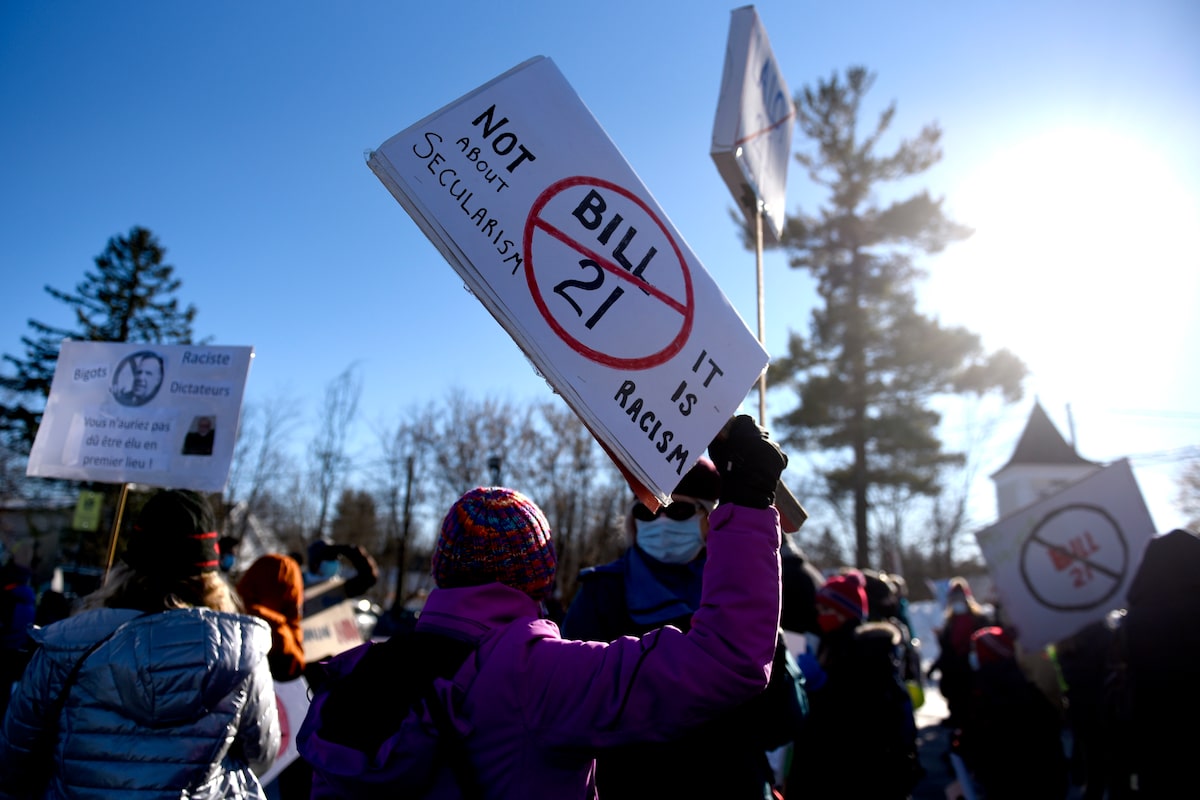People rally against Bill 21 in Chelsea, Que., in 2021.Justin Tang/The Canadian Press
Quebec sovereigntists could hardly hide their disappointment last week after Ottawa finally tabled its legal arguments before the Supreme Court of Canada, which is preparing to hear a constitutional challenge to the province’s controversial secularism law.
The Parti Québécois and Bloc Québécois were, er, praying that Prime Minister Mark Carney’s government would come down squarely on the side of those who first launched the court challenge to the province’s Act respecting the laicity of the state, also known as Bill 21, which bans public employees in a position of authority from wearing religious symbols on the job.
Ottawa calls on Supreme Court to clarify the law around use of Charter’s notwithstanding clause
Instead, Justice Minister Sean Fraser’s submission before the top court steered clear of the core issue of whether Bill 21 violates fundamental rights guaranteed by the Canadian Charter of Rights and Freedoms. In what opponents of Bill 21 could only qualify as a monumental cop-out, the Carney government chose not to pick the fight that sovereigntists had been gunning for, declaring in its factum: “The Attorney-General of Canada takes no position, on any basis whatsoever, on the constitutional validity of the provisions” of Bill 21.
Perhaps to distract from its own nakedness, the Carney government did come up with a novel argument according to which the repeated use of the Constitution’s notwithstanding clause to suspend certain Charter rights is “tantamount to denying [the] very existence” of those rights, and, hence, unconstitutional.
The only problem is that Section 33 of the Constitution explicitly authorizes governments to invoke the notwithstanding clause every five years to suspend Charter rights. Hence, asking the court to prohibit its repeated use is either an invitation to judicial activism on an unprecedented scale or an insult to the intelligence of the eight Supreme Court judges who will hear the case. C’est selon.
Opinion: It’s official: The Supreme Court’s ruling on Bill 21 will be one for the ages
(The ninth judge, Justice Mahmud Jamal – a former chair of the Canadian Civil Liberties Association, which is an appellant in the Bill 21 case – agreed to recuse himself after the Quebec government put up a fuss, alleging a potential conflict of interest.)
The Prime Minister’s weak stand on Bill 21 will contribute to the growing sense of abandonment among progressive Liberal MPs who have already had to process his rolling back of his predecessor’s tax and climate policies. Still, it is no mystery why Mr. Carney opted not to provoke Quebec sovereigntists only a year before Quebeckers go to polls in an election that the PQ is currently favoured to win.
By depriving the PQ of the fight with Ottawa that it had been relishing, Mr. Carney has provided a helping hand to Quebec Liberal Party Leader Pablo Rodriguez in the run-up to that vote. And the PLQ desperately needs to pick up support among francophone Quebeckers if it has any hope of challenging the PQ for government.
Globe editorial: Ottawa’s end run around the Constitution
Mr. Rodriguez last week vowed that a Liberal government led by him would not repeal Bill 21. Though he said he would suspend the preventive use of the notwithstanding clause to shield the law from court challenges, he did not rule out re-enacting the clause were a court to later strike down Bill 21. Bill 21, Mr. Rodriguez conceded, has created “a form of equilibrium or social peace” in Quebec.
If he seems hard to follow, it is because Mr. Rodriguez, a former federal cabinet minister under Justin Trudeau, is between a rock and hard place. Francophone Quebeckers strongly support Bill 21. But the Liberal base in urban and multi-ethnic Quebec is staunchly against that law and proposed legislation to extend the ban on wearing religious symbols to all public-school employees, not just teachers.
A Léger poll released last week found that more than three-quarters of francophones want to see Quebec secularism either strengthened (46 per cent) or maintained (32 per cent). Only 17 per cent of non-francophones favour strengthening secularism in Quebec; more than a third (36 per cent) said they wanted to see it softened.
Léger also found that almost two-thirds of francophone Quebeckers support banning prayer in public spaces – as the current Coalition Avenir Québec government is proposing to do – compared to 47 per cent of non-francophones who oppose the idea. The online poll of 1,053 Quebeckers did not carry a margin of error. For comparative purposes, a probabilistic sample of that size would be accurate to within plus or minus three percentage points.
You can see why secularism is not a winning issue for Mr. Rodriguez. A frontal attack by Ottawa on Bill 21 before the Supreme Court would hurt the Quebec Liberals far more than it would ever help Mr. Carney cement his bona fides as a defender of the Charter.

